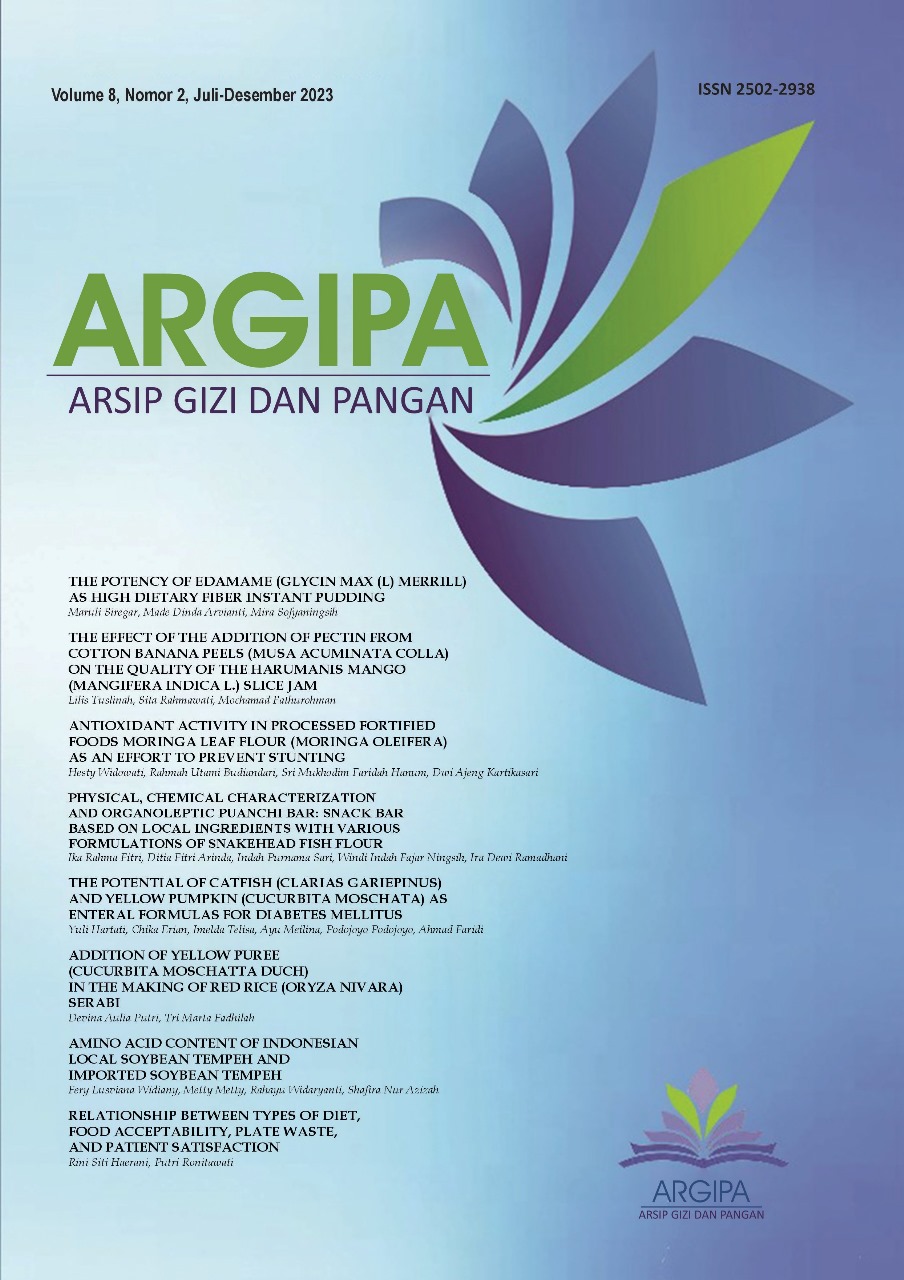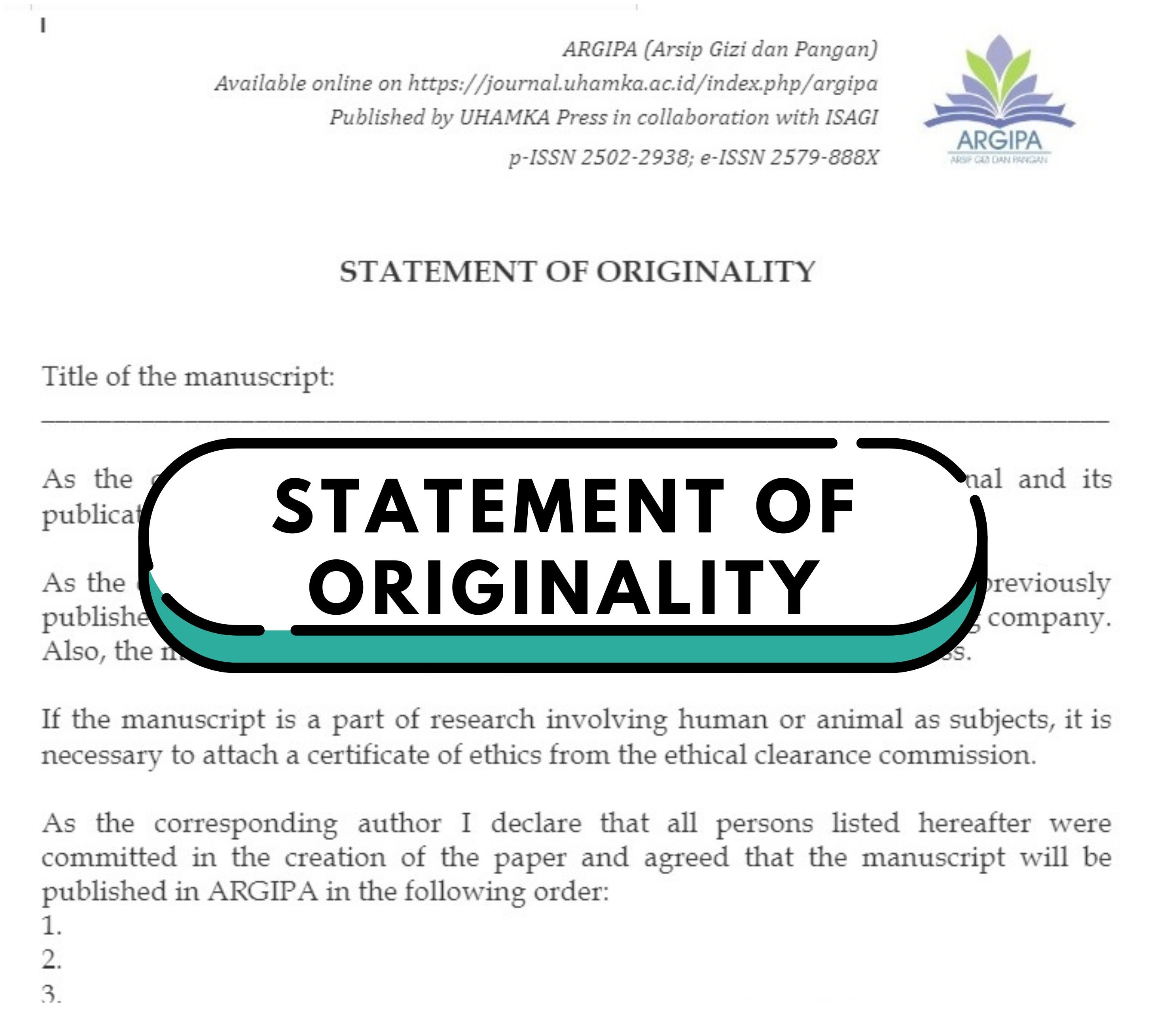Physical, chemical characterization and organoleptic puanchi bar: snack bar based on local ingredients with various formulations of snakehead fish flour
DOI:
https://doi.org/10.22236/argipa.v8i2.12243Keywords:
Puanchi Bar, Snakehead Fish Flour, Physical Characterization, Chemical Characterization, Triangle TestAbstract
In order to achieve quality standards that are fit for consumption, food quality evaluation evaluates the quality of food ingredients that have undergone processing or cooking. A snack bar called Puanchi Bar was created by using local ingredients in its production, including red mold rice, snakehead fish, and puan sugar. The study was conducted to ensure that Puanchi Bar is practical and complies with established criteria. A laboratory test employing tools and a triangle test are utilized in the physical and chemical characteristic tests to determine whether or not there is a difference between the three formulations. Tests were carried out on 3 selected formulas namely F3, F6, and F9. In the texture and color tests there were insignificant differences but in the moisture content and ash content there were significant differences in the three formulations. In testing conducted in laboratories, Puanchi Bar F3 was shown to have the best texture, color, moisture content, and ash content while still meeting the criteria. Based on aroma, texture, and color factors, the Puanchi Bar F3 formula was the most distinctive and popular among the 18 panelists, according to the findings of the triangle test. It may be said that Puanchi Bar F3 is the best formula in terms of physical characterization, chemical characterization, and the result of the triangle test.
Downloads
References
Alkhamdan, T., & Husain, R. (2022). Pemanfaatan Tepung Ikan Gabus (Channa striata) Dalam Pembuatan Kerupuk Ikan. Jambura Fish Processing Journal, 4(1), 25–36.
Arbi, A. S. (2009). Pengenalan Evaluasi Sensori. In Pengenalan Evaluasi Sensori (pp. 1–150).
Dewanta, E. C., Wijayanti, I., & Anggo, A. D. (2019). Karakteristik Fisiko Kimia dan Sebsori Pasta Makaroni Dengan Penambahan Tepung Ikan Gabus (Channa striata). Jurnal Ilmu Dan Teknologi Perikanan, 1(2), 21–29.
LIPI (2020) ‘Survei Ekonomi Rumah Tangga Indonesia di Masa Pandemi Covid19’ diakses pada 20 Desember 2022 dari http://lipi.go.id/berita/surveiekonomi-rumah-tangga-indonesiadimasapandemi-covid-19/22121
Mazidah, Y. F., Kusumaningrum, I. and Safitri, D. E. (2019) ‘Penggunaan Tepung Daun Kelor pada Pembuatan Crackers Sumber Kalsium’, ARGIPA (Arsip Gizi dan Pangan), 3(2), pp. 67–79.doi:10.22236/argipa.v3i2.2462
Nadhiroh, U., & Susanto, H. (2017). Pengaruh Volume Minyak Goreng Dan Bentuk Biji Edamame Shape on Product Characteristics of Fried Edamame with Vacuum Frying Method. Jurnal Pangan Dan Agroindustri, 5(1), 26–37.
Niga, M. I. B., Suptijah, P., & Trilaksani, W. (2022). Isolation and Characterization Extract and Powder from Snakehead Fish ( Channa striata ) and It Potency as Immunomodulator Stocks. IPB University, 25, 52–66.
Pajar, M. (2022). Pengaruh Penambahan Karagenan dan Gula Merah Pada Pembuatan Coklat Oles Berbahan Gulo Puan. Universitas Sriwijaya.
Poernomo, D., Suseno, S. H., & Wijatmoko, A. (2004). Pemanfaatan Asam Cuka, Jeruk Nipis (Citrus Aurantifolia) dan Belimbing Wuluh (Averrhoa bilimbi) untuk Mengurangi Bau Amis Petis Ikan Layang (Decapterus spp.). Jurnal Pengolahan Hasil Perikanan Indonesia, 7(2), 11–18.
Prameswari, R. D., & Estiasih, T. (2013). Pemanfaatan tepung gembili (Dioscorea esculenta L.) dalam pembuatan cookies the utilization of lesser yam (Dioscorea Esculenta L.) flour in producing cookies. Jurnal Pangan Dan Agroindustri, 1(1), 115–128. https://jpa.ub.ac.id/index.php/jpa/article/view/11
Pratama, F. (2018). Evaluasi Sensoris. In Palembang : Unsri Press (Edisi 3).
Putri, J.C.S., Haryanti, S., Izzati, M. (2017). Pengaruh Lama Penyimpanan Terhadap Perubahan Morfologi dan Kandungan Gizi Pada Umbi Talas Bogor (Colocasia esculenta(L.) Schott. Jurnal Biologi, pp. 49-58.
Riskesdas. (2018). Hasil Utama Riset Kesehatan Dasar. Kementrian Kesehatan Republik Indonesia, 1–100. https://doi.org/1 Desember 2013
Rusmono, M., & Nasution, Z. (2014). Sifat Fisik dan Kimia bahan Baku Industri. Momon Rusmono Zein Nasutio, 1–24.
Santoso, S. O., Janeta, A., & Kristanti, M. (2018). Faktor-Faktor yang Mempengaruhi Pemilihan Makanan pada Remaja di Surabaya. Jurnal Hospitality Dan Manajemen Jasa, 6(1), 19–32. http://publication.petra.ac.id/index.php/manajemen-perhotelan/article/view/6399/5818
Sari, I. P., Ningsih, W. I. F., & Arinda, D. F. (2022). Pengembangan Snack Bar Berbasis Pangan Lokal Dalam Upaya Intervensi Gizi Sensitif pada 8000 HPK : Social Mapping dan Formulasi Produk. Fakultas Kesehatan Masyarakat.
Simanjuntak, A. T. R. (2021). Karakteristik Snack Bar dengan Variasi Suhu Pemanggangan dan Perbandingan Tepung Ampas Kelapa dengan Tepung Kedelai. In Repository Unsri. Universitas Sriwijaya.
Tarwendah, I.P. (2017). Studi Komparasi Atribut Sensoris dan Kesadaran Merek Produk Pangan, Jurnal Pangan dan Agroindustri, pp. 66-73.
Triasih, D., Laksanawati, T. A., & Nurlailatul, S. (2021). Karakteristik Kimia Salami dengan Penambahan Ekstrak Angkak (Red Mold Rice). Jurnal Peternakan Nusantara, 7(April), 7–10.
Ummah, R., Probosari, E., Anjani, G., & Afifah, D. N. (2020). Komposisi Proksimat, Kandungan Kalsium dan Karakteristik Organoleptik Snack Bar Pisang Raja dan Kacang Kedelai Sebagai Alternatif Makanan Selingan Balita. Warta Industri Hasil Pertanian, 37(2), 162. https://doi.org/10.32765/wartaihp.v37i2.6159
UNICEF (2020). Status Anak Dunia 2019. Anak Pangan dan Gizi. Diakses pada 20 Desember 2022 dari https://www.unicef.org/indonesia/id/statusanakdunia-2019

















